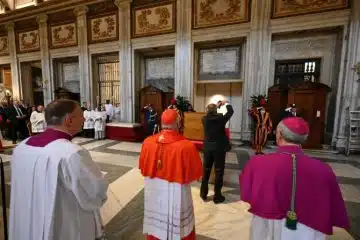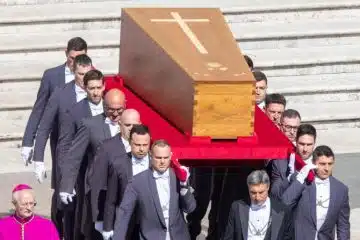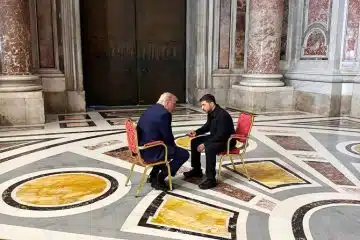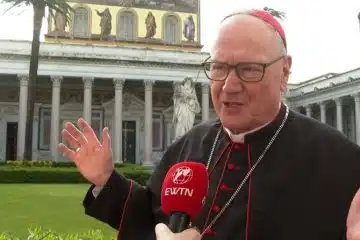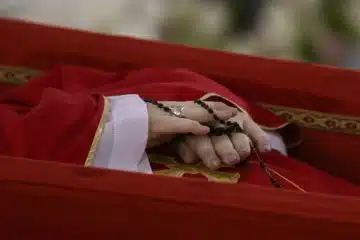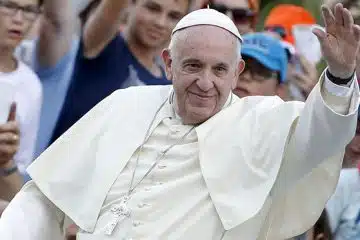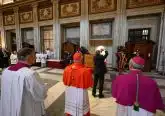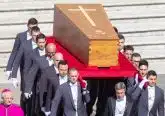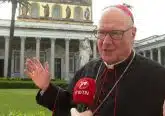Slain Jesuit inspires another Salvadoran archbishop and an ode to martyrs

IMAGE: CNS photo/courtesy of the Archdiocese of San Salvador
By Rhina Guidos
WASHINGTON (CNS) — Jesuit Father Rutilio Grande has been credited with inspiring Blessed Oscar Romero, archbishop of San Salvador, El Salvador, toward a journey of defending the poor that led to his martyrdom in 1980.
But now, Father Grande’s life seems to have inspired the current archbishop of San Salvador, who issued a pastoral letter remembering, praising and apologizing for the long-overdue recognition of Catholics, including U.S. church members, who suffered persecution and death during Central America’s armed conflicts.
“In my capacity as pastor of this church, I have to acknowledge with humility that we have committed many mistakes,” Archbishop Jose Luis Escobar Alas said in the letter issued March 12, the 40th anniversary of Father Grande’s killing. “We have crossed the threshold of the third millennium in the Salvadoran archdiocese without having pronounced a word of recognition for all the men and women who were victims of persecution, torture, repression” and who ultimately died as martyrs, he said.
The archbishop unveiled the letter in the hamlet of El Paisnal, the hometown of Father Grande, a vocal priest who worked with poor rural communities in El Salvador and advocated for better social conditions for them. He died in 1977 after being shot more than a dozen times in an ambush that also resulted in the death of two of his rural parishioners, Manuel Solorzano, a man in his 70s, and Nelson Rutilio Lemus, a teenager of 15 or 16, who were accompanying him to a novena honoring St. Joseph, the patron saint of their hometown. Some say his death led Archbishop Romero, who was a close friend, to take up Father Grande’s devotion to the poor.
The document of more than 200 pages urges Catholics and “people of goodwill” to learn about and follow the example of Father Grande and other slain members of the church, including U.S. Father Stanley Rother, and four U.S. churchwomen who lost their lives while serving the poor of Central America in the 1980s. The Vatican announced March 13 that Father Rother, brutally murdered in 1981 while serving a poor indigenous community in Guatemala during a mission for the Archdiocese of Oklahoma City, will be beatified in September.
Archbishop Escobar praised Father Rother, who was born on a farm, for his contributions to agriculture in Guatemala and identifying “as one more peasant” with the local community of Santiago Atitlan, where he served. He also praised four U.S. churchwomen — Maryknoll Sisters Ita Ford and Maura Clarke, Ursuline Sister Dorothy Kazel and laywoman Jean Donovan — who were beaten, raped and murdered by government soldiers in El Salvador in 1980. Though their work was precarious, they decided to stay with those who were suffering in the country, Archbishop Escobar said.
He said he hoped all of El Salvador’s Catholic martyrs would one day be recognized but focused for now on 24 lives who were “consecrated to God” and who died because of their faith: two bishops, 17 priests, a seminarian about to be ordained, three religious sisters and a lay woman. He also acknowledged that an untold number of Salvadoran “lay martyrs” whose lives are now being documented also perished. More than 70,000 are estimated to have died in the Salvadoran conflict that lasted roughly from the late 1970s until peace accords were signed in 1992.
“I’m sorry that this act of justice and charity for our martyrs wasn’t carried out,” long ago, he said in the letter. Some of it could have been due to practices and spirituality “contrary to the renewal of the Second Vatican Council” and other church teachings from Latin America that focused on the poor and that were not always welcomed by some in the church of El Salvador.
The oligarchy, and “sons and daughters of darkness,” who owned much of the country’s mass media, helped in those days drive a false message, one that promoted slanderous views and defamation of people who were faithful Christians, Archbishop Escobar wrote. Many Salvadorans believed that Catholic men and women who were helping the poor were communists, politically minded enemies of the system, wolves in sheep’s clothing, “guerrilleros,” members dangerous organizations, the archbishop said.
“They were none of this. They were and are martyrs,” Archbishop Escobar wrote.
The letter came from an archbishop who, much like his predecessor, Archbishop Romero, made a quiet entrance to the post, but has become more active on social matters, particularly those disproportionately affecting the country’s poor. His first pastoral letter issued in 2016 focused on the El Salvador’s rampant violence, which has called attention to the country as one of the most dangerous places in the world not at war. Archbishop Escobar recently joined efforts asking El Salvador’s legislature to ban metal mining in the country and even joined a demonstration against it.
The letter, titled, “You will also testify, because you have been with me since the beginning,” is a reference to the Gospel of St. John and features a cover depicting Father Grande’s funeral at San Salvador’s Metropolitan Cathedral of the Holy Savior, where Jesus greets a long of line of people dressed in white entering the church. In the illustration, Jesus holds a palm frond in one hand, a symbol of martyrdom, and the crown of thorns in the other.
While the letter was issued March 12, it was publicly presented March 14, steps away from Father Grande’s tomb. Father Estefan Turcios, national director of the Pontifical Mission Societies in El Salvador, who was in El Paisnal for the presentation, said the letter was an homage of which Father Grande was the focus. However, he said, the archbishop also deemed it important to mention the lives of others so that they, too, can serve as models to follow in a time when El Salvador is experiencing serious violence, one that is almost “worse than the war.”
The country still has difficulty discussing the conflict, Father Turcios said, but the letter serves as way to make others aware of what happened so it is not erased from the country’s historic memory and to acknowledge those who died for the Gospel.
In late 2016, the Archdiocese of El Salvador announced the completion of part of the process that it hopes soon will lead to the beatification of Father Grande and ultimately to his canonization. They also recently submitted to the Vatican documents for a case of a medical healing, a possible miracle attributed to the intercession of Archbishop Romero, who was beatified in 2015.
“What better place than here (close to) Father Rutilio Grande to make the presentation of this letter,” Archbishop Escobar said during the event. “We have to honor those who deserve it. … Let’s come to know them, love them, have a devotion to them, invoke them, imitate them because they have marked an imprint in our country that we must follow. It is a beautiful imprint of fidelity to Christ, of fidelity to the Gospel. From heaven, they see us with love, they intercede for us and bless us.”
– – –
Follow Guidos on Twitter: @CNS_Rhina.
– – –
Copyright © 2017 Catholic News Service/U.S. Conference of Catholic Bishops. www.catholicnews.com. All rights reserved. Republishing or redistributing of CNS content, including by framing or similar means without prior permission, is prohibited. You may link to stories on our public site. This copy is for your personal, non-commercial use only. To request permission for republishing or redistributing of CNS content, please contact permissions at [email protected].


